Händel did not write any variations on the la Folia-theme but often people are referring to the Sarabande in D Minor from harpsichord suite nr. 11, Book II (1727) as Händel's Folia because the structure and treatment of the piece is quite similar to the La Folia-variations.
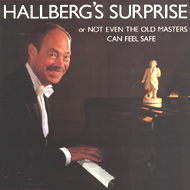
Bengt Hallberg in his Folia interpretation
|
- Hallberg, Bengt (jazzy-piano) ' Hallberg's Surprise or not even the
old masters can feel safe'
Carl-Gunnar Ahlen wrote for the cover:
Among Swedish piano players there are few with such rich experience of improvisational playing as Bengt Hallberg. Although no person with normal general knowledge can have failed to hear him in some of the different constellations in which he has taken part during almost 40 years, it is not every day that he is giving a piano recital of his own, although of course only on his own special terms ....
- Released 1987 by Phontastic LP PHONT 7581
- Duration: 6'00"
- Recording date: March 25 and 26 and May 18, 1987 at the Royal Academy of Music, Stockholm, Sweden
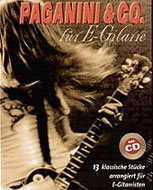
This is kind of a hard-rock version for electric guitar and ment as a teaching device.
- Harms, Wieland 'Paganini & Co. für E-Gitarre, 13 klassische Stücke für E-Gitarristen'
- Released by Gerig Verlag as a compact disc and sheet music with tablatures (92 pages in format 21 x 29 cm).
- Duration: 3'04"
- Recording date: unknown
- The Harp Consort (Andrew Lawrence-King: director and harp, Rodrigo del Pozo: guitar,
Steve Player: dance and guitar, Hille Perl: viola da gamba, lirone and guitar, Lee Santana: theorbe and guitar, Pedro Estevan: percussion) 'IX. Internationales Bodensee-Festival '97: Kultur aus Spanien'
- Released 1997 by Bodensee Festival 3 cd-box BSF 97/1-3 (CD 1: Spanische Musik des Mittelalters und der Renaissance)
- Duration: 3'44"
- Recording date: Mai 14, 1997 in Lindau, Stadttheater (a live recording) Herluf Donslund, Keld Nørgaard, Else Madsen, Poul Lendal and Ole Stripp.
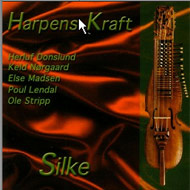 As in many Scandinavian Folias consists this tune of two parts. The first part is following the chord progression of the Folia although not all the chords have the same duration.
As in many Scandinavian Folias consists this tune of two parts. The first part is following the chord progression of the Folia although not all the chords have the same duration. - Harpens Kraft (Herluf Donslund - Nøgleharpe (nyckelharpa), violin and hardingfele
Keld Nørgaard - Sækkepiber (bagpipes), guitar, violin, keyboards, humell, lerkrukke, mundspil (Jew's harp) and keyboard,
Else Madsen - accordion , kirkeorgel and bjælder
Poul Lendal - Lire, skovtromme, guitar, mundspil, kantele and slagtøj (flute),
Ole Stripp - Bass and slaghumle)
- Released May 2001 by CD-Roots compact disc ordernr. 16.99
- Duration: 4'15"
- Recording date: unknown
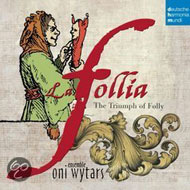
Although the Folía is in the chord progression of the later Folía as classified by Richard Hudson, all ingredients of the early Folía are present (instrumentation and rhythm).
- Ensemble Oni Wytars 'La Follia, the triumph of Folly'
- Released 2013 by Deutsche Harmonia Mundi compact disc 88765449782
- Duration: 2'08"
- Recording date: October 1-3, 2011 in Kurtheater, Bad Kissingen, Germany
- See also recommended recordings
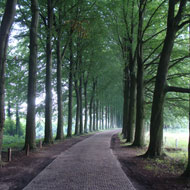
Some Folias are composed without the awareness that the Folia theme is involved. The mind is spinning a web of smooth chords and melody lines to find out later that a familiar theme is involved. A fascinating process in itself.
 |
Duration: 1'55", 9 kB. |
It's funny how this theme and harmony gets into one's head; it got into mine and started to generate variations before I even knew its name.
I must have heard it somewhere because I asked a friend who knows about early music if she knew La Follia and she gave me some sheet music that
matched the tune in my head. The well-defined harmonic structure made it possible for me to write variations with only a very basic knowledge of harmony.
I was also inspired by Benjamin Britten's 'Noye's Fludde', which builds up rich musical textures from very simple elements so that everyone can join in.
A light-hearted and very amateur group of friends played my variations for descant recorder, flute, cello and piano at our Arts Festival in Derby (England) in
May 2004. I have also arranged it for a slightly larger ensemble to play in August 2008, and it is intended to be adaptable for any smallish group.
- Elizabeth Heaton and the Borrowed Din Quartet
- Released by Elizabeth Heaton in midi format by Capella (music-writing software)
- Duration: 1'55"
- Recording date: April 2004
- More about Elizabeth Heaton and the score of la Follia you can find at http://myweb.tiscali.co.uk/epheaton/music/musicindex.html
Commissioned by the Minnesota Chamber Orchestra
- Henze, Hans Werner
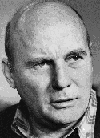
- Published by B. Schott's Sohne c.1978
- Duration: c.22'00"
- Score 100 p., 33 cm
- Publisher No. ED 6841 ('Studien- und Dirigierpartitur ohne soloinstrument')
- ISMN: M-001-07248-9
- l'Orchestre Philharmonique de Strasbourg , conductor Latham-König, Jan
- Broadcasted by WDR radio in the program 'Musikpassagen' (Germany) November 27, 1999
- WDR Eigenproduktion
- Duration: c.19'36"
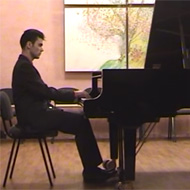
Yevheny Hepliuk wrote about his Folia:
"The first reason of choosing the Folia theme was the impression of Rachmaninov`s Corelli Variations. I wanted to compose something with more optimistic ending. Then I became interested in history of the Folia and was impressed that so many composers of baroque music used it. In the beginning of my Variations the Folia theme approaches us from depth of centuries to our time. So, in my composition I was inspired by Rachmaninov, Liszt and Handel. I also used another ancient popular theme - Dies irae."
- Hepliuk, Yevheny (piano)
- Title: Variations on a Folies d'Espagne theme for piano.
- Pubished at YouTube in 2015 by the composer.
- Recorded for YouTube by the composer in 2012
- Duration: 13'17"
- At YouTube https://www.youtube.com/watch?v=Ul6AdwdKdkU
- Barrios Guitar Quartet
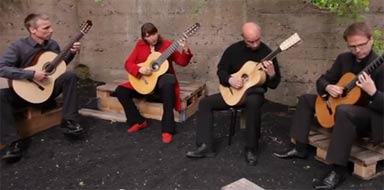
An arrangement for four guitars of an extract of Vivaldi's Follia.Live concert of the ensemble
Duration: 4'17" direct link to YouTube
© 2014 by Barrios Guitar Quartet- Title: Sonata op. 1 Nr. 12 "La Follia" RV 63
- Arrangement by Stefan Hladek
- Published by Barrios Guitar Quartet at YouTube January 2014
- Duration: 4'17"
- Recording date: unknown
- The website of Barrios Guitar Quartet http://www.bgq.de/index_e.html
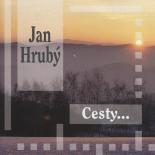 Jan Hruby (violin, organ, keyboards, percussion) Andrea Hruba (flute) Rudolf Halek (accordion).
Jan Hruby (violin, organ, keyboards, percussion) Andrea Hruba (flute) Rudolf Halek (accordion).Kind of synthesizer Folia based upon the version of Corelli.
- Hrubý, Jan 'Cesty...'
- Released 2001 by Indies Records
- Duration: 2'35"
- Recording date: 2001 location unknown
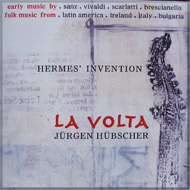 This Folia starts like a mandolin concert by Vivaldi, but before you realize it you are way up in the Andes.
This Folia starts like a mandolin concert by Vivaldi, but before you realize it you are way up in the Andes.Jürgen Hübscher wrote about this Folia in an e-mail January 2006:
On behalf of the Follia I can give you the following informations:
It is an arrangement of mine. I used some parts of the
"Folias de Espagna" for Salterio which is
described at your website (Manuscript Barcelona, 1764).
The Edition of Karl-Heinz Schickhaus was used as "basic source" for my arrangement
and I added about 10 "new" Variations of my own invention in the style of Sanz/Corelli
and named it La Follia.
It was arranged for my Ensemble LA VOLTA for two concertizing
soprano-instruments: Baroque Mandolin ( 6-course mandoline)
and Charango (sic!), a small guitar (played in some Lateinamerican
countries) My tuning is the same G.Sanz demands in his Instructions.
As instruments for the Basso Continuo I used a bass-cittern (Pandora)
and a small cittern. The bass-part is executed by a mexican Guitarron,
an acoustic 6 string "double-bass-guitar", tuned on octave lower
than the normal guitar. So my arrangement demands 5 musicians.
 |
Duration: 1'08", 1109 kB. (128kB/s, 44100 Hz) |
- La Volta Ensemble directed by Jürgen Hübscher 'Hermes' Invention'
- Released 2005 by Doberman-Yppan compact disc DO 540
- Duration: 07'35"
- Recording date: May 2005 (not indicated in the documentation) in Tonstudio EDT ('Adullam Kapelle'), Basel, Switzerland
- More about La Volta at the website http://www.la-volta.com
- Distribution for USA/ Canada: www.dobermaneditions.com
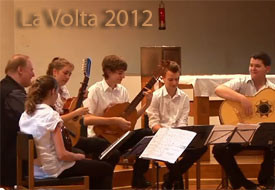
A live performance of La Volta including a poem by Heine
|
- La Volta Ensemble directed by Jürgen Hübscher
- Title: La Follia, version 2012, anonymous, 18th Century, Italy
- Released by Jürgen Hübscher at YouTube July 9, 2012
- Duration: 9'04" (including the poem by Heinrich Heine "Don Henriques")
- Instruments: 6 course Baroque Mandolin, "Baroque"- Charango, Pandora, Cuatro Puertorricense, Mexican Guitarron
- Recording date: June 16, 2012 in Basel, Schwitzerland
 In the documentation is stated that the manuscript was used from an Italian private collection.
In the documentation is stated that the manuscript was used from an Italian private collection.Jürgen Hübscher wrote about this Folia in an e-mail January 2006:
I recorded another Folia for baroque guitar solo for the Label Open Windows. I simply forgot that I recorded it for this production. This Folia is a result of my "improvising exercises" on the subject. Finally I wrote it down in tabulatur; but changed it constantly, when I performed it in concerts. I did'nt want to use my name as "composer", so I atributed it to the "famous" Anonymous. A slightly different version I recorded for the Leonarda-Label in New York, Title "La Musica" which is already listed on your website.
 |
Duration: 1'10", 1126 kB. (128kB/s, 44100 Hz) |
- Hübscher, Jürgen (baroque guitar) 'Italienische Musik für Laute / Barockgitarre und Cembalo / Tischorgel 1550 - 1760'
- Title: Anonym La Folia
- Released 1988 by Edition Open Windows vinyl OW 0.03 and compact disc OW 003
- Duration: 06'30"
- Recording date: May 1988 in St. Martin-Kirche, Trochtelfingen
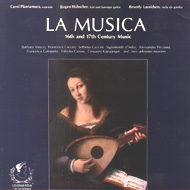
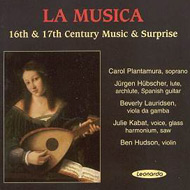 Unfortunately no detailed source is mentioned for this piece in the documentation of the vinyl recording.
There is a theme and 12 variations which all follow closely the later Folia-structure. The two different playing styles 'rasgueado' or strumming style (variations 3, 10 and 12)
and 'punteado' or plucking style are featured in a virtuoso way.
Unfortunately no detailed source is mentioned for this piece in the documentation of the vinyl recording.
There is a theme and 12 variations which all follow closely the later Folia-structure. The two different playing styles 'rasgueado' or strumming style (variations 3, 10 and 12)
and 'punteado' or plucking style are featured in a virtuoso way.Carol Plantamura and Jürgen Hübscher wrote about the Folia-composition:
La Folia is an anonymous seventeenth-century piece for Spanish guitar from a private Italian manuscript.
- Hübscher, Jürgen (baroque guitar) 'La Musica, 16th and 17th Century Music'
- Released 1985 by Leonarda LP LPI 123, re-released 2005 by Leonarda compact disc LE 350
- Duration: 6'08"
- Recording date: July 1984 at Congregation Eman-EL of Westchester, Westchester County, New York, USA.
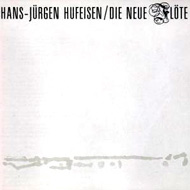
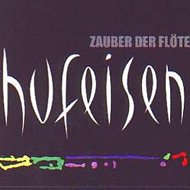 A rather straight forward Folia for recorder and piano.
A rather straight forward Folia for recorder and piano.Hans-Jürgen Hufeisen plays a variety of different recorders from piccolo to sub-bass. He has a classical background and his music features traditional pop and jazz elements.
- Hufeisen, Hans-Jürgen 'Die neue Flöte'
- Released 1987 by Boulevard Records Hammer Musik GmbH compact disc BLDCD 514
- Duration: 05'03"
- Recording date: not mentioned in the slipcase, recorded in recording studio Ebony in Wohlen, Switserland and Tonstudio Leonberg in Leonberg, Germany
- Hufeisen, Hans-Jürgen 'Zauber der Flöte'
- Released 1999 by Bell compact disc ordernumber unknown
- Duration: 05'03"
- Recording date: unknown in recording studio Ebony in Wohlen, Switserland and Tonstudio Leonberg in Leonberg, Germany
 The Folia theme can be heard in a traditional fashion from 12'03"
till 13'24"
Derek Carew for the slipcase in 2007:
The Folia theme can be heard in a traditional fashion from 12'03"
till 13'24"
Derek Carew for the slipcase in 2007:Ballet suite 'Das Zauberschloss'
Unlike Sappho, this work was not published in any form and even less is known about it. There is no mention of a performance, although since it too was written for Viganò, it seems likely that it received at least one.
[...] A final, longer try still fails, but after a short return to the rustic style, the music changes to a slow, stately rendering of the then well-known tune 'La Follia'(or 'Folies d'espagnol') which, already centuries old and featuring in countless variation-sets during that time, is here subjected to Hummel's varying.
It appears first on strings alone, then on oboe accompanied by a countermelody on violins, with all the strings playingquite a tricky pizzicato. A bassoon joins the oboe and the section comes to a decisive end.
- London Mozart Players directed by Howard Shelley 'Hummel, premiere recordings'
- Released 2007 by Chandos Records compact disc Chan 10415
- Duration: 19'13"
- Recording date: July 3 and 4, 2006 in St. Silas the Martyr church, Kenrish Town
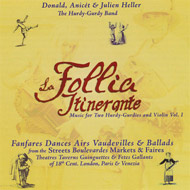 Donald Heller wrote in an e-mail 23 March 2011:
Donald Heller wrote in an e-mail 23 March 2011:
The music of La Follia is the soundtrack of my life.
We have used several different sources of inspiration for our "anonymous" follia: Nicholas Chedeville's Follia for two hurdy-gurdies, the anonymous Faronel's Ground, an anonymous Italian Follia, as well as inspirations from the usual gang: Corelli, Marais, Vivaldi, etc.
You are right in that the arrangement is ours: in fact, this recorded version of my wife Anicet and I on Hurdy-Gurdies and our son Julien, on violin, is an improvisation (based on the works mentioned) and as such, is a bit different whenever we play it together. In fact, I've been working hard since we made that recording and have in my Follia bag of tricks many other couplets, esp. from the Chedeville.
La Follia, also known as Les Follies d'Espagne and Faronel's Ground, is a proud and anguished melody that is played above a pulsing bass line, and is then followed by sets of variations, or couplets. More than three hundred composers have created their own interpretation of La Follia, a tradition that began four hundred years ago and continues to this day.
The last track is a Follia and gives the CD its name:
La Follia Itinerante: the itinerant madness, der Fahrende Wahnsinn. It is that moment in time and place when the soul catches a slow motion glimpse of itself traveling willy-nilly through the maelstrom of the great vortex. At once noble and base, it is coloured in a chromatic blue melancholy and dry red pathos. There too is the peace that comes with acceptance of one’s fate…and the anguished impossibility of not struggling against this same fate…la Follia Itinerante holds up a mirror that we may see our selves as we really are: beggars naked before God. And makes us laugh at our own pitiful and ludicrous condition. A true Follia is unique at each playing. It exists for a moment and then vanishes. This one was caught on a warm and sunny afternoon in a garden house on the southern slopes of the Schwarzwald. It takes as inspiration the Follias of Nicholas Chédeville, Corelli, Vivaldi, Marais and the many other composers, known and unknown, who have added to our treasure store of Follias.
- The Hurdy-Gurdy Band: Anicét Heller (hurdy-gurdy), Julien Heller (violin) and Donald Heller (hurdy-gurdy)
'La Follia Itinerante: Baroque Street Music for Two Hurdy-Gurdies & Violin Vol. I"
- Released 2009 by Gurdybuskers compact disc
- Duration: 8'28"
- Recording date: 2009 in the Black Forest in Germany
- More about the Hurdy-Gurdy Band at their website http://www.hurdygurdyband.com/HGB-On-the-Road/musicpages/music3.html
